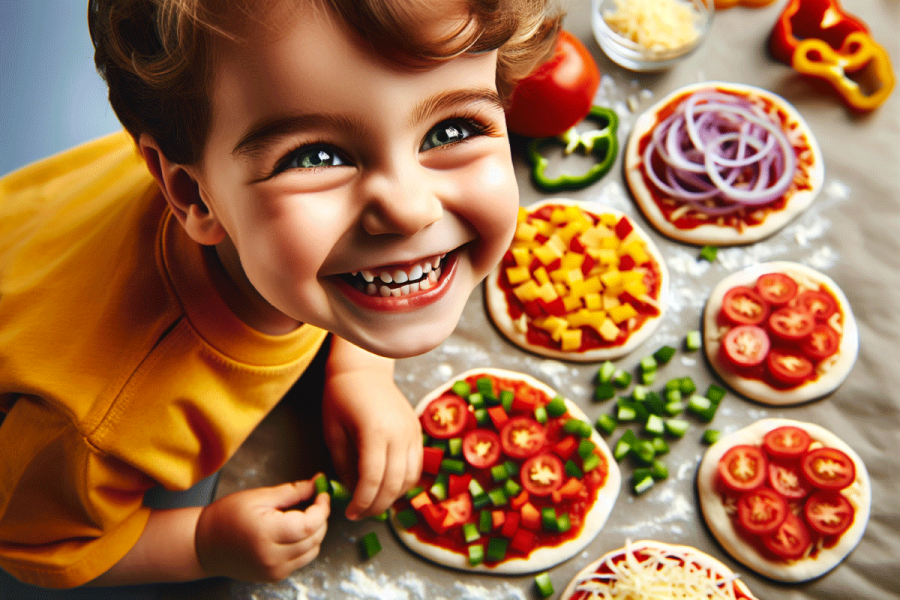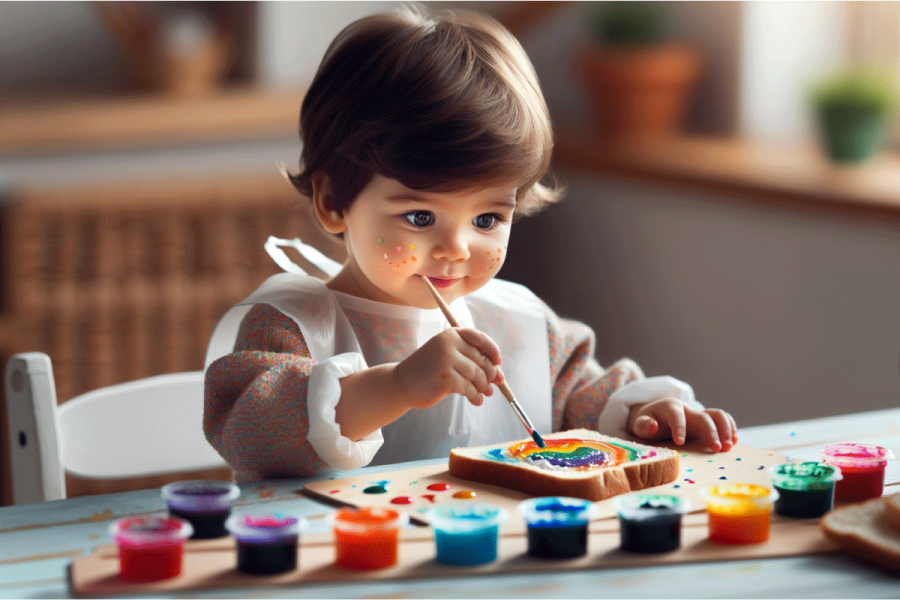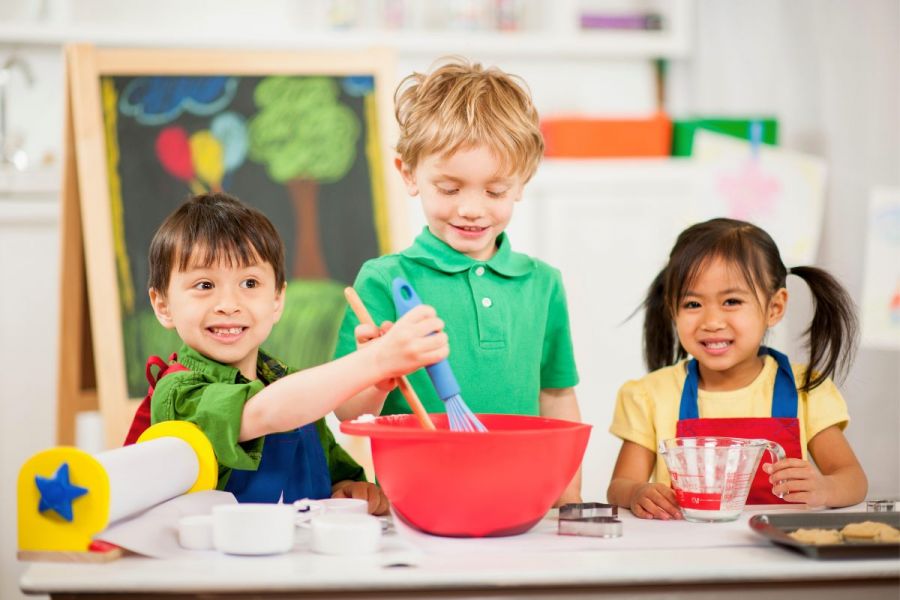Cooking activity for preschool ideas
Whisking up fun!
Discovering the perfect cooking activity for preschool can be as simple as stepping into your kitchen. From stirring simple recipes to shape exploration with cookie cutters, these kitchen projects are specially designed to entertain and educate your preschoolers. Equip them with skills like fine motor development, sensory exploration, and basic math, all while they enjoy the delights of cooking.
Cooking activities for preschoolers
- Cooking activities are a playful and educational way for preschoolers to engage their senses, enhance fine motor skills, and learn essential concepts like shapes, colors, and sequences.
- Simple, fun, and child-friendly cooking projects, from making mini pizzas and fruit salads to décor projects like cookie decorating, serve as a platform for preschoolers to explore, create, and taste their creations, fostering both independence and a love for cooking.
- Safety is paramount in the kitchen, so using the right tools and practicing allergy awareness are essential for ensuring a safe and enjoyable experience as preschoolers learn, create, and play with their food.
Whisking up fun for engaging preschoolers in the kitchen
The kitchen is a fantastic playground for little explorers. The sights, sounds, and smells captivate their senses, and the hands-on nature of cooking activities allows them to learn essential skills while having fun. These activities not only give preschoolers a sense of accomplishment but also foster their growth and learning.
Discover how simple recipes, cookie cutters, and sprinkling can ignite excitement in your kitchen.
Stirring up excitement with simple recipes
An easy and engaging recipe can be a young chef’s first love in the kitchen, and what could be a more perfect introduction than the timeless classic - Rice Krispies treats! The process of using melted butter, watching marshmallows transform into a gooey delight, and then stirring in the crisp Rice Krispies provides a tactile and sensory-rich experience.
This simple cooking activity also introduces the fascinating concept of how heat changes the properties of food, making it one of the fun cooking activities to try.
Creating shapes and smiles with cookie cutters
Cookie cutters are not just tools; they’re a gateway to a world of playful learning. Whether it’s pancakes or mini pizzas, cookie cutters guide preschoolers in shape recognition while refining their fine motor skills. This hands-on experience of rolling dough, cutting out shapes, and adding toppings is not only fun but also a great way to entice picky eaters to try new foods.
The joy of sprinkling and decorating
If you’ve ever seen a child’s eyes light up at the sight of a cookie decorated with colorful frosting, you know the joy of decorating in cooking activities. Decorating biscuits or cookies allows preschoolers to express their creativity, improve fine motor skills, and learn the art of spreading.
The moment when they sprinkle the final touch of brown sugar onto their creations is not only a moment of independence and decision-making, but also so much fun, making this an enjoyable and empowering exercise.
Preschooler-approved cooking pProjects
Elevate this culinary adventure with some preschooler-approved cooking projects. From mug cakes and fruit juice popsicles to a festive ‘Pumpkin Pie in a Cup’, the possibilities are endless and exciting. These projects are not only fun but also packed with learning opportunities.
Prepare to immerse yourself in these delightful kitchen projects with your eager little chefs!
Happy little chefswoth mini pizzas
There’s something special about mini pizzas that makes them an instant hit with the little ones. Maybe it’s the joy of rolling out their own ready mixed pizza dough, spreading the sauce, or sprinkling the cheese. Or perhaps it’s the pride they feel when they see their assembled mini pizzas transform in the oven.
This activity not only introduces them to the art of shaping and assembling food but also teaches them about the baking process.
Colorful fruit salad creations
Imagine a vibrant canvas of fresh fruit, each piece cut and arranged by your little one. Preparing a fruit salad or making fun fruit kebabs offers preschoolers a chance to practice their cutting skills and learn about different fruits.
As they thread grapes and berries in a specific order, they learn about patterns and sequences, developing fine motor skills along the way.
Chocolate chip delights
What’s cooking without a touch of sweetness? Dipped strawberries and mini pumpkin chocolate chips muffins are delightful cooking projects that offer a sensory-rich experience. As preschoolers melt the chocolate, dip the strawberries, and mix the muffin batter using the strawberries chocolate chips method, they practice fine motor skills while enjoying the process. And the best part? They get to savor the fruits of their labor, making it a rewarding experience!
Sensory play through cooking
Cooking offers a feast of sensory experiences. Preschoolers can:
- Feel the dough
- Smell the spices
- See the vibrant colors of fresh produce
- Hear the sizzle of a pan
Engaging in sensory play fosters their development, enhances their observation skills, and nurtures their curiosity.
Let’s investigate some activities that provide a blend of sensory explorations!
Playing with dough
Playing with dough is a sensory-rich experience that preschoolers simply love. As they knead, roll and shape the dough, they’re not just creating, they’re also learning. Activities like making homemade soft pretzels or crafting with Alphabet Dough offer an engaging and hands-on way to refine their motor skills, all while having fun playing!
Scented adventures with spices
Adding a dash of scent to playdough activities takes sensory play to a whole new level. Imagine the warm aroma of gingerbread or the sweet scent of strawberries filling your kitchen as your preschooler plays with the dough. These scented playdough activities enhance sensory awareness, create associations with flavors and seasons, and add an extra layer of fun to the playtime.
Nurturing skills with preschool cooking activities
Cooking is a skill, but in the hands of a preschooler, it’s a tool for learning and development. As they cook, preschoolers are learning about:
- Vocabulary
- Sequencing
- Measurement
- Problem-solving
Cooking provides a hands-on experience that engages their senses and helps them develop important skills.
Let’s examine in detail how cooking cultivates these essential skills in your little ones.
Counting and measuring made fun
Counting eggs, pouring water into cups, timing the baking - cooking is brimming with opportunities for preschoolers to enhance their mathematical skills. It’s a hands-on way to familiarize them with concepts of volume, counting, and understanding capacity. And the best part? All this learning happens amidst a lot of mixing, stirring, and fun!
Mixing clors and flavors
Cooking allows preschoolers to play with colors and flavors. From mixing primary colors to create secondary ones to exploring gradients by adding varying amounts of food coloring, cooking is a canvas for color exploration. As they experiment with different shades and intensities, they’re learning about color theory and mathematical concepts in the most delicious way possible.
Healthy snacks for eager little hands
Snack time is a big deal for preschoolers. So why not turn it into an opportunity for learning and fun? Simple and nutritious snack recipes like Veggie Faces with Cream Cheese and Pumpkin Pie in a Cup not only tickle their taste buds but also stimulate their curiosity.
Let’s find out how to transform snack time into a hands-on learning experience!
Veggie faces with cream cheese
Imagine the joy on your preschooler’s face as they create their own edible masterpiece - a Veggie Face! Spreading cream cheese or sunflower seed butter onto whole-grain bread, arranging fresh veggies to form features, and then seeing their creation come to life is a fun and healthy snack activity. It’s a great way to let their creativity shine while practicing fine motor skills.
Pumpkin pleasure and easy recipe for canned pumpkin treats
Pumpkin Pie in a Cup is more than just a delightful snack. It’s a hands-on learning experience that introduces preschoolers to the concept of seasonal eating and following simple recipes. Using canned pumpkin as a base, they can safely help to prepare this festive treat, fostering their skills and confidence in the kitchen.
Safety first and other tips for preschoolers cooking
The kitchen can be a fun place for preschoolers, but it’s also important to ensure their safety. From supervision to creating a ‘kid-free zone’ and choosing the right tools, certain precautions can help prevent accidents and make cooking a safe and enjoyable activity for your little ones.
Let’s consider some safety tips to ensure your young chefs are protected.
Choosing the right tools
The right tools can make all the difference in ensuring safety in the kitchen. Opt for child-friendly tools like nylon knives or butter knives for cutting activities. These tools can cut soft items without being dangerously sharp.
Also, choose utensils with large handles to improve grip and control, making cooking tasks safer and more accessible for small hands.
Allergy awareness in the kitchen
Food allergies are a serious concern in the kitchen. From cleaning grills and utensils to implementing a strict labeling system, there are several ways to ensure allergy awareness. Here are some crucial steps towards a safe cooking environment:
- Open communication with parents
- Special sippy cups for toddlers with allergies
- Teaching everyone involved in food preparation to wash hands before handling allergen-free foods
Creative exploration with food art
Food art is a delicious way to spark creativity and sensory exploration in preschoolers. From decorating cupcakes to crafting seasonal cookies, these activities offer a unique blend of art and cooking. These engaging projects not just foster creativity and fine motor skills but also provide opportunities for thematic learning.
Let’s venture into the vibrant world of food art.
Edible paintings with food dye
Take a slice of bread, some edible paint, and let your preschooler’s imagination run wild! Activities like Rainbow Toast introduce preschoolers to color mixing and the transformation of bread when toasted. It’s an art project and a science experiment rolled into one, culminating in a delicious, colorful toast that’s a feast for the eyes and the palate!
DIY pizza canvas
A DIY Pizza Canvas is a great way for your preschoolers to unleash their culinary creativity. Whether it’s paper plates or felt pieces, designing their own pizzas fosters creativity and sensory exploration.
Heart-shaped mini pizzas or pizzas with their favorite toppings, the possibilities are as limitless as their imagination.
Encouraging independence wotj cooking tasks for preschoolers
Encouraging independence in cooking tasks can help preschoolers develop essential life skills. From tearing lettuce and snapping green beans to assembling their own sandwiches, these tasks not only enhance their motor skills but also instill confidence and a sense of achievement.
Let’s explore how these straightforward tasks can encourage independence in your little chefs.
Mastery of mixing
Mixing is an integral part of cooking, and mastering it can be a big win for preschoolers. Activities like stirring pancake batter or mashing bananas offer hands-on learning and a sense of accomplishment. As they mix and stir, they’re not just making food, they’re also developing fine motor skills and learning about consistency and texture.
The art of assembling
Assembling food is a lot like building a puzzle. It involves sequencing, decision-making, and a dash of creativity. Constructing sandwiches or wraps gives your preschooler a chance to add toppings, spread condiments, and see how all the components come together to form a delicious whole. It’s a hands-on way to foster independence and culinary creativity.
The perfect recipe
In the whirl of flour and sizzle of pans, there’s a world of learning awaiting your preschooler. From sensory exploration and fine motor skills to creativity and independence, cooking activities offer a plethora of benefits. So, tie those aprons and whip out the spatulas, because it’s time to whisk up some fun and learning in the kitchen!
How do you introduce cooking to preschoolers?
To introduce cooking to preschoolers, start with very simple one-step tasks such as pouring milk into cereal, peeling a banana, and washing vegetables. As they grow, gradually involve them in more complex cooking activities like measuring ingredients and using specialty tools.
What learning outcome is cooking?
Cooking is a valuable learning experience for kids, helping them develop math, language, and science skills while building confidence and healthy eating habits.
How does cooking help a child's cognitive development?
Cooking helps a child's cognitive development by enhancing reasoning, problem-solving, and creativity skills through activities such as measuring, sequencing, and cause and effect. Following recipes also teaches counting, measuring, sequencing, sorting, and fractions, contributing to school readiness skills.
At what age should a child start cooking?
You can start teaching your child basic cooking skills as early as 2 years old, with your supervision, and can introduce more advanced skills around ages 6-8.
What kind of cooking activities can preschoolers safely participate in?
Preschoolers can safely participate in simple cooking activities like mixing batter, using cookie cutters, spreading condiments, or assembling sandwiches. Enjoy cooking with your little one!



